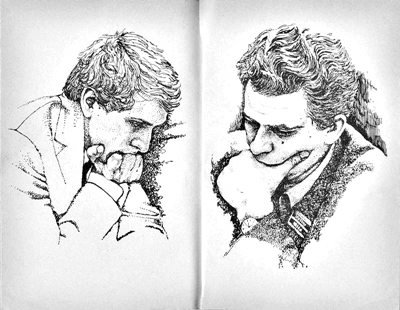Brad Darrach described the transition from the 10th World Champion to the 11th in his usual colorful style.
A more straightforward account of the end of the match can be found in the book I introduced in an earlier post, GM Svetozar Gligoric, Player/Journalist (August 2022):-
Gligoric's book 'Fischer v Spassky: The Chess Match of the Century' (Fontana, 1972), contains good accounts of the off-board happenings between games.
The only artwork in the book consists of two uncaptioned, unattributed sketches of the pensive chess warriors inserted after the historic 21st game.

Left: Robert Fischer
•
Right: Boris Spassky
The artwork is followed by two pages summarizing the zeitgeist of the match. Titled, 'In Retrospect', it starts,
Among the world champions since the war, Boris Spassky has distinguished himself. During a relatively short period of five years he came victorious out of personal duels with a most exquisite group of contemporary grandmasters -- Keres, Geller, Tal, Larsen, Korchnoi and Petrosian. No other world champion could boast such an impressive list of triumphs in matches.
At the same time, Robert Fischer was growing alongside him into another chess giant who, with his general results and high percentages, outclassed the achievements not only of his contemporaries, but of any individual in the whole history of world chess.
Years had to go by, and many difficulties had to be overcome, until the match between these two players in their prime became reality, the match which every chess enthusiast considered as the most wishful chess event of our century. By happy coincidence -- after a quarter of a century of supremacy by one country -- it was also the first clash at the top in the spirit of healthy sporting rivalry between the best representatives of two different parts of the world.
All that gives a clue to the unexpected chess fever which overwhelmed continents during those two months in Reykjavik. The match opened a new, unforeseen chapter in the history of this noble game, which has existed modestly for more than one thousand years, only now to be discovered, by a good part of mankind as the best game ever invented by the human mind.
The last page in the book has a single paragraph:-
The American grandmaster Robert Byrne played in the very strong Alekhine Memorial Tournament in Moscow in November / December 1971. He was asked for his opinion on the result of the Fischer-Spassky match and was widely quoted in the Soviet press as follows:-
"Fischer will win by 12 1/2 to 8 1/2 and will be World Champion for the next twelve years!"
GM Byrne's prediction about the final score was right on the mark. Who could have known that his prediction about the length of Fischer's reign was far-fetched fantasy?
No comments:
Post a Comment